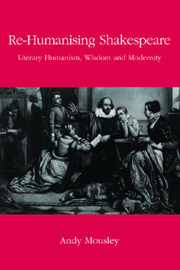Book contents
- Frontmatter
- Contents
- Acknowledgements
- Introduction: Literary Humanism, Wisdom and Modernity
- Part I Denaturing Human Nature
- 1 Questioning the Human: Hamlet
- 2 Emptying the Human: Othello
- 3 Ironising the Human: The Merchant of Venice
- 4 Historicising the Human, Humanising the Historical: I Henry IV
- Part II How to Live
- Conclusion
- Notes
- Bibliography
- Index
4 - Historicising the Human, Humanising the Historical: I Henry IV
from Part I - Denaturing Human Nature
Published online by Cambridge University Press: 12 September 2012
- Frontmatter
- Contents
- Acknowledgements
- Introduction: Literary Humanism, Wisdom and Modernity
- Part I Denaturing Human Nature
- 1 Questioning the Human: Hamlet
- 2 Emptying the Human: Othello
- 3 Ironising the Human: The Merchant of Venice
- 4 Historicising the Human, Humanising the Historical: I Henry IV
- Part II How to Live
- Conclusion
- Notes
- Bibliography
- Index
Summary
In their introduction to Historicism, Psychoanalysis and Early Modern Culture (2000), Carla Mazzio and Douglas Trevor write that ‘“historicism” has become the default mode of critical practice’. Historicism has taken a variety of different forms in the last thirty to forty years (cultural materialism, new historicism, materialist feminism, the new economic criticism, presentism), but one characteristic that many of them share is a scepticism about universals. One effect of this has been to dehumanise history, to empty history of its human interest, scope and scale. There have of course been contrary effects, which I shall argue are mainly the product of the literary humanism still practised by cultural historicists, despite their avowal of anti-humanist positions: the ‘very idea of a “defining human essence” is precisely what new historicists find vacuous and untenable’, writes Stephen Greenblatt, yet one effect of Greenblatt's and other new historicists' recourse to anecdote has been precisely to humanise history. The purpose of the first half of this chapter is therefore to locate the humanising, dehumanising and rehumanising tendencies within the cultural historicisms that have dominated literary studies in recent years. The second half of the chapter will discuss Shakespeare's own treatment of history in I Henry IV (1596–7), focusing on Falstaff's humanising and Hal's dehumanising influence upon it.
In I Henry IV – to anticipate briefly the second half of the chapter – political and historical issues are inseparable from existential issues.
- Type
- Chapter
- Information
- Re-Humanising ShakespeareLiterary Humanism Wisdom and Modernity, pp. 76 - 94Publisher: Edinburgh University PressPrint publication year: 2007

